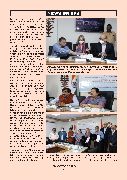NEWS BRIEFS Speaking on the occasion Smt. DarshnaJardosh said that the GIZ project is aimed at increasing volume of cotton production at least on 90,000 hac with participation of 1.50 lakh cotton farmers with yield increase by 10%. This will enable capacity build- ing of the 1.50 lakh farmers& entre- preneurs of which about 30% will be women beneficiaries. The Minister mentioned that India is the largest cotton producer in the world and also the 2nd largest consumer of cotton in the world with estimated consumption of 303 lakh bales (5.15 Million Metric Tones i.e. 20% of world cotton consumption of 1505 lakh bales (25.59 Million Metric Tones). It plays a major role in sustaining thelivelihood of an estimated 6 Million cotton farm- ers and about 50 Million people en- gaged inrelatedactivity suchascotton processing & trade.Shri Sanjay Sharan, Jt. Secretary, Ministry of Textiles, Dr. Rossitza Krueger, Programme Head, Sustainable Cotton Project, GIZ and Mr Mohd-El- Khawab, Programme Coordinator GIZ India She further stated that the GIZ project will also help in enhancing employ- ment and women empowerment in training and capacity building on sus- tainable cotton growing practices by innovation in new cotton processing procedures and ginning etc. Shri U. P. Singh in his address said that today being the ‘World Cotton Day’ is an important day for the Min- istry of Textiles. He said that cotton is important cash crop and the entire edifice of Textile Industry depend on natural fibers likecotton, jute and wool. He said that development without sustainability has lost value in current scenario. The Secretary informed that focusof project is to work with major global textile companies to create the “pull” factor for improved market ac- cess by the farmers for their sustainably grown cotton. The project envisages promotion of sustainable cotton cultivation methods emphasiz- ing on implementation of good agri- culture practices, he added. The project follows "From shelf to field” approach, with the strategy to link consumers to the cotton growers in India and work along the entire sup- ply chain. The project is also focus-ing on creation and promotion of trans- parency about the prevalence and application of internationally recog- NCM-OCTOBER 2021 70nized/accepted sustainability stan- dards and promoting measures that reduce the water footprint in cotton
